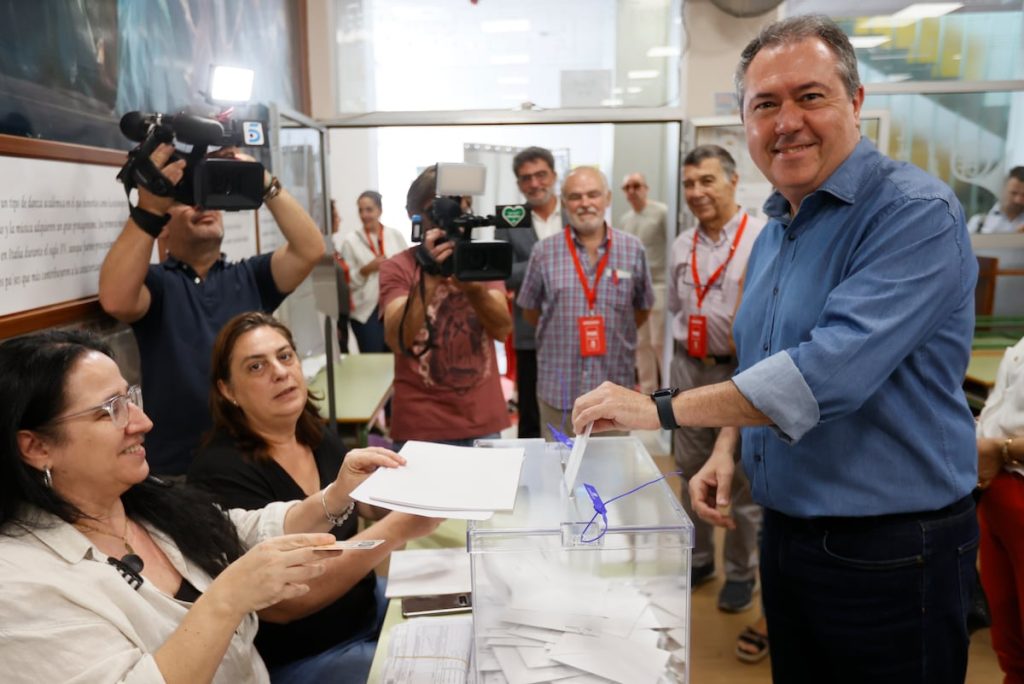The Andalusian branch of the PSOE is currently in turmoil, discontented after their fourth consecutive electoral defeat since 2022. Despite this, there is no open schedule for congresses that would allow for imminent changes in the regional or provincial leadership, so any organizational issues will be addressed “when appropriate.” This was stated in a resolution by the party’s secretary general, Juan Espadas, and the eight provincial secretaries following a meeting at the regional headquarters. While Espadas did not explicitly ask for support from local leaders, he did express his intention to run for president of the Junta in 2026, according to sources within the party.
At the meeting, Espadas was asked by journalists whether local leaders were there to support him, to which he replied, “I support them and they support me, and we will evaluate the results.” Three provincial secretaries—Seville, Granada, and Almería—expressed their “full support” for the regional leader. However, this was not included in the resolution, as it would imply that Espadas is facing internal questioning and needs explicit validation, given some calls for his resignation from within the party.
The resolution notably lacks any self-criticism following their loss in the European elections in Andalusia, both overall and in each of the eight provinces and capitals. The Andalusian leaders, who consider themselves as “the highest authorities” of the PSOE in Andalusia, highlight their 32.2% vote share in the recent European elections, stating it was two points above the national average for the PSOE. They point out that the PSOE only won in Catalonia, Navarre, and the Canary Islands with lower percentages. They also accuse the PP of creating a hostile political environment with constant harassment of Pedro Sánchez.
Despite acknowledging that the election results on June 9th in Andalusia were not ideal, they affirm the party’s strong electoral base in the past three elections. They emphasize the shift in the gap between the PP and PSOE votes from 43% to 24% in 2022 to 37% and 32% in the recent elections, attributing this to the recovery of socialist votes and the decline in PP support. Additionally, they suggest a decline in the popularity of the President of the Junta, Juan Manuel Moreno, who led the PP to its first victory in European elections in the most populous region of Spain.
In conclusion, the provincial secretaries reaffirm their commitment to the political project initiated at the beginning of the current legislative term and call for continued improvement in opposition work and party mobilization at the local level. They stress the need to strengthen their political project and enhance engagement within the party. Finally, they address internal issues, stating that any organizational changes will be addressed within the party’s structures and at the appropriate congresses.
Within the eight local branches of the PSOE in Andalusia, there are varying levels of discontent, with some calling for leadership changes, particularly noticeable in the Málaga branch. This dissatisfaction intensified after the municipal elections in 2023, where the PSOE not only lost all eight capitals but also many municipalities that had enabled the party to govern in the provincial councils. Of the six they previously controlled, they now only lead in Seville and Jaén. Many party leaders attribute the party’s decline to issues at the municipal level, where the PSOE is struggling and facing demobilization. Despite Espadas’ desire to run for president again, internal polarization within the PSOE makes the outcome uncertain, with some believing he can bounce back and others skeptical.


